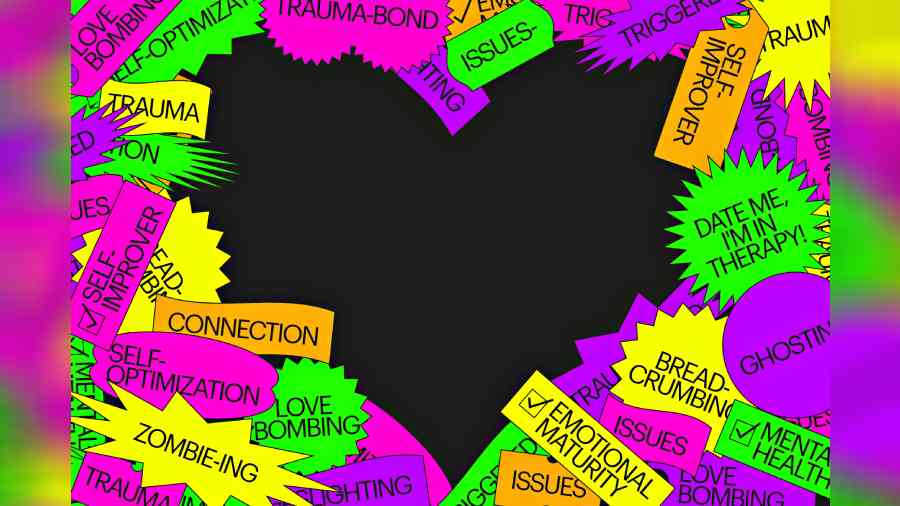When Lauren S c o t t w a s bored, dating became a remedy. It could be draining, droning and repetitive. At wine bars and picnics and miniature golf courses and ice cream parlours, she churned out answers about her cybersecurity classes and her taste in music. Still, it was something to do. Scott, a 23-year-old graduate student in Tampa, Florida, US, slogged through roughly 34 first dates last year, sometimes stacking three in a week.
One, in particular, seemed like it could lead somewhere. The guy texted her incessantly. He said he missed her. He claimed that he told his family about her. But, after a night spent making pizza and half-watching a movie on Scott’s couch, he stopped replying to her text messages.
Scott vented about this on a phone call with her mother, who offered a diagnosis: The guy, she said, had “love bombed” her daughter.
Scott laughed. “I was like, how do you even know that word?” she said. Her mother heard the term, a description of narcissistic abuse, on the radio.
Dating comes with its own dictionary, a collection of buzzwords including “breadcrumbing”, “zombie-ing” and, of course, “ghosting”. But in recent years, psychology terms such as “love bombing”, “gaslighting” and “trauma bonding” have also wedged their way into the lexicon. Hinge, a popular dating app, still lets users post sunglass-clad selfies and proclaim their love for espresso martinis. But now they can also respond to prompts like “Therapy recently taught me___,” “A boundary of mine is___” and “My therapist would say I___.”
Becca Love, a 40-year-old clothing designer and dance teacher in Montreal, Canada, who uses the pronouns they and them, often asks dating app matches, “What does connection look like to you?” Around the third date, they initiate discussions about their prospective partner’s “attachment style”, a tidy summation of childhood trauma.
This terminology isn’t unusual. Therapy-related words and phrases have trickled into workplaces, surfaced at schools and galvanised people online. But the proliferation of these terms among daters represents a distinct shift.
For the past 12 years, Helen Fisher, a biological anthropologist and a senior research fellow at the Kinsey Institute and chief science adviser for Match.com, has led a study researching the behaviour and attitudes of single people in the US. The study, Singles in America, which is conducted by Match, surveys about 5,000 Americans (not Match members) every year. In 2022, Fisher was stunned by one finding. She asked participants to rank what they were looking for in a prospective partner, expecting the usual answers: sexual attractiveness, trustworthiness, humour and similar interests. This time, however, another characteristic made the top five list. Respondents wanted matches with emotional maturity, the ability to process and grapple with one’s feelings.
“I’m a baby boomer,” Fisher said. “In the ’60s and ’70s, this is not what we were trying to sell. We were trying to sell intelligence and being fun and being creative and being career oriented. Now they’re selling mental health.”
Selling has always been a part of courtship. People broadcast their assets — looks, humour, charm — in a de facto competition, one that was heightened or at least clarified, by the arrival of dating apps. A growing number of people now broadcast intimate, specific details, including proclamations about their mental health, Carbino said. It’s a technique used both to signal your values and to weed people out, she said — if therapy is essential to you, for example, you might not want to date someone who’s never been.
Being transparent about therapy also imbues you with a certain cultural cachet, said Carolina Bandinelli, an associate professor at the University of Warwick in England who studies romance and digital culture. It suggests that you’ve done “the work”. In other words, you’re enlightened, the best version of yourself. “It’s part of this discourse of self-optimisation,” Bandinelli said.
And for heterosexual men in particular, the lingo of psychoanalysis has an added benefit: it can help dispute stereotypes about men avoiding their emotions, Bandinelli said.
“It seems to be a cheat code men are using,” said Jared Freid, 37, a comedian and podcast host in New York City, US, who’s combed through thousands of questions and stories from listeners in his 10 years of hosting podcasts about dating. “Men are writing ‘I go to therapy’ on dating apps only because it gets them more women,” he said.
Videos and infographics about dating clog Kailah Chavis’ TikTok and Instagram feeds: instructions on how to avoid a love bomber, spot a narcissist or assert boundaries with romantic partners. “I’m always hearing about your ‘inner child’, ‘healing your inner child’,” said Chavis, a 24-year-old in Los Angeles, US.
Capri Campeau, the 23-year-old actor, saw the language of therapy surge while he was dating and has tried to temper the urge to overuse it in his relationship. When Campeau leaves a mound of dishes in the sink, for example, a behaviour that he said reminded his girlfriend of a particularly messy ex, they avoid using words like “triggered”. Instead, they discuss why the dishes can make his girlfriend think about her ex.
“It’s been really helpful for us to try to use language to connect with each other,” Campeau said, “instead of just using words to judge.
New York Times News Service










